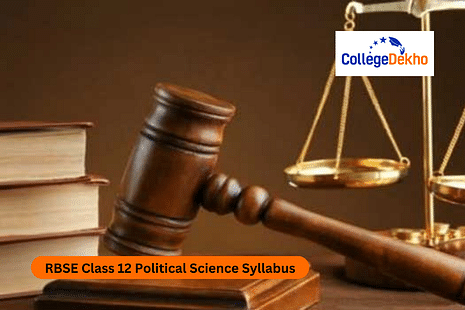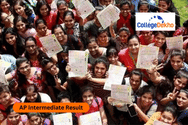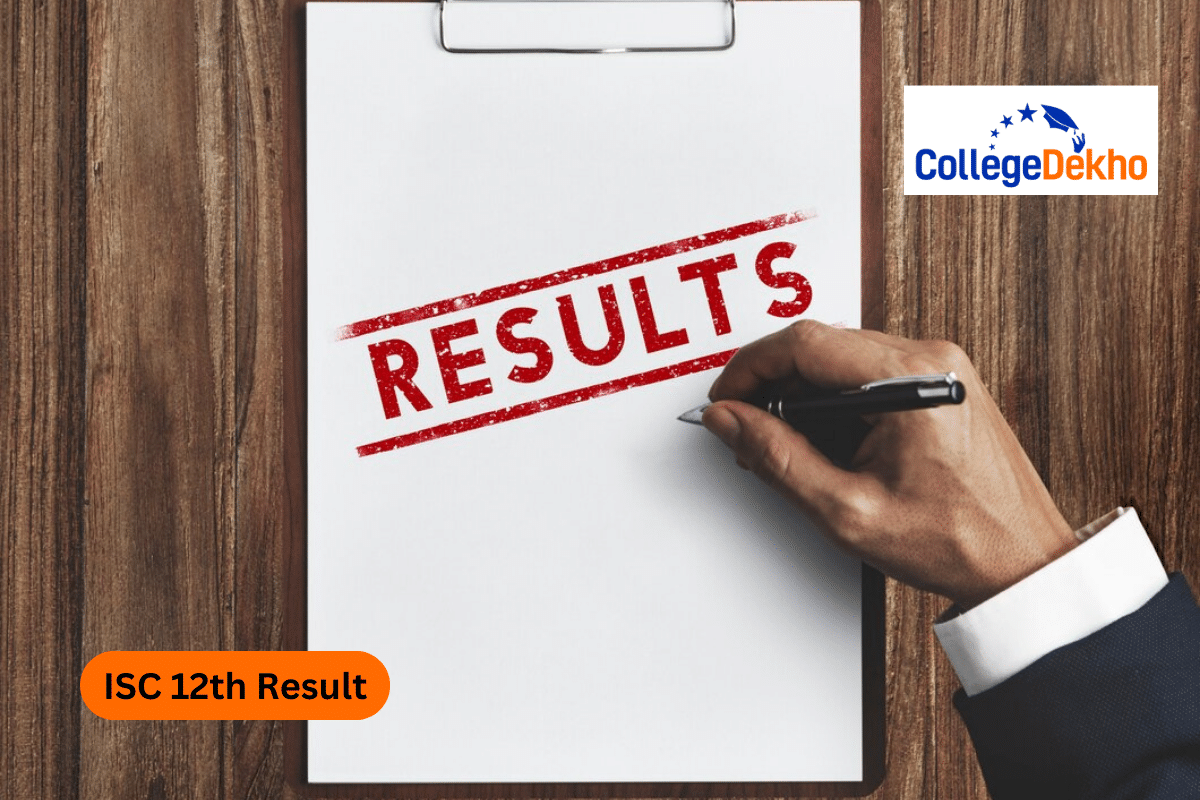

Never Miss an Exam Update
RBSE Class 12 Political Science Syllabus 2024-25 has been released on the official website. The syllabus is divided into 2 parts i.e. Part A - Contemporary Global Politics and Part B - Indian Politics since Independence. A total of 6 chapters are included in Part A and 8 in Part B however each part is of 40 marks. Challenges of Nation Building, The End of Bipolarity, and Politics of Planned Development are some of the high-weightage chapters included in the RBSE Class 12 Political Science syllabus for 2024-25. When preparing for the RBSE class 12 examination, you should check all the topics along with the marking scheme to prepare a strategic preparation plan. The duration of the theory exam will be 3 hours and 15 minutes. The board will conduct the RBSE 12th exam 2025 in March/April 2025, in pen and paper mode. Check all the details regarding political science class 12 syllabus 2024-25 rbse.
RBSE Class 12 Latest Updates
May 16, 2025: Rajasthan board is likely to release the RBSE Class 12 result between May 19 and May 25, 2025 on the official website. The result will be released for all three streams. Check the result using the login credentials.RBSE Class 12 Political Science Syllabus 2024-25
The syllabus is intended to provide students with a solid foundation in Political Science principles as well as the skills required to understand and analyze political events and processes. The syllabus covers various topics, from traditional political theories to contemporary political challenges. The table below consists of the detailed class 12 political science syllabus 2024-25 rbse.Chapter No. and Name | Learning outcome with specific competencies | Marks |
|---|---|---|
PART A-CONTEMPORARY WORLD POLITICS | ||
1. The End of Bipolarity Topics to be focused: a) The Soviet System b) Gorbachev and the disintegration c) Causes and Consequences of disintegration of Soviet Union d) Shock Therapy and its Consequences e) New entities in world politics Russia Balkan States Central Asian States f) India's relations with Russia and other post-communist countries |
| 8 Marks |
2. Contemporary Centres of Power Topics to be focused: a) European Union b) Association of Southeast Asian Nations c) Rise of China as an economic power d) Japan and South Korea as emerging powers) |
| 8 Marks |
3. Contemporary South Asia Topics to be focused: a) Military and Democracy in Pakistan and Bangladesh b) Monarchy and Democracy in Nepal c) Ethnic Conflict and Democracy in Sri Lanka d) India-Pakistan Conflicts e) India and its Neighbours f) Peace and Cooperation |
| 6 Marks |
4. International Organizations Topics to be focused: a) Meaning and importance of International Organisations b) Evolution of the UN c) Structure and function of International Organisations d) Principal Organs of UN e) Reform of the UN after Cold War f) Reform of Structures, Processes and Jurisdiction of the UN g) India and the UN Reforms h) Key Agencies: IMF, World Bank, WTO, ILO, IAEA. i) NGO: Amnesty International, Human Rights Watch. j) Implications and Future of International Organizations |
| 6 Marks |
5. Security in the Contemporary World Topics to be focused: a) Meaning and Type of Security. b) Traditional concept of security c) Non-tradition notions of Security. d) New Sources of Threats e) Cooperative Security f) India’s Security strategy |
| 5 Marks |
6. Environment and Natural Resources Topics to be focused: a) Environmental Concerns b) Global Commons c) Common but differentiated Responsibilities d) India’s Stand on Environment Issues e) Environmental Movements f) Resource Geopolitics g) Rights of Indigenous peoples |
| 7 Marks |
PART B-POLITICS IN INDIA SINCE INDEPENDENCE | ||
1. Challenges of Nation Building Topics to be focused: a) Challenges for the new Nation. Three Challenges. b) Partition: Displacement and Rehabilitation. Consequences of Partition. c) Integration of Princely States. The problem. Government’s approach. Hyderabad, Manipur d) Reorganisation of States. |
| 7 Marks |
2. Era of One-Party Dominance Topics to be focussed: a) Challenge of building democracy. b) Congress dominance in the first three general elections. Nature of Congress dominance, Congress as a social and ideological coalition. Tolerance and management of Factions c) Emergence of opposition parties |
| 6 Marks |
3. Politics of Planned Development Topics to be focussed: a) Political contestation. Ideas of Development. Planning, Planning Commission b) The Early Initiatives, The First Five Year Plan. Rapid Industrialisation |
| 7 Marks |
5. Challenges to and Restoration of the Congress System Topics to be focused: a) Challenge of Political Succession, From Nehru to Shastri, From Shastri to Indira Gandhi b) Fourth General Election 1967, Context of the Election. Non Congressism, Electoral Verdict, Coalitions, Defections c) Split in the Congress, Indira vs the Syndicate, Presidential Election 1969 d) The 1971 Election and Restoration of Congress, The outcome and after Restoration? |
| 6 Marks |
8. Recent Developments in Indian Politics Topics to be focused a) Context of 1990s b) Era of Coalition Alliance Politics c) Political rise if the Backward Classes Mandal Implemented Political Fallouts d) Communalism, Secularism and Democracy. Ayodhya Dispute Demolition and after e) Emergence of New Consensus f) Lok Sabha Elections 2004 g) Growing Consensus |
| 7 |
How to download RBSE Class 12 Political Science Syllabus 2024-25?
Follow the steps given here to download the RBSE 12th Political Science 2024-25 syllabus. Get the syllabus in PDF format and ensure you cover up all the topics.- Step 1: Visit the official website of the board.
- Step 2: Navigate to the home page and click on the 'अनुदेशिका 2020 एवं पाठयक्रम 2024-25’ in the left hand panel.
- Step 3: The "RBSE 12th Syllabus 2024-25" link will be displayed on the screen.
- Step 4: Click on the "RBSE 12th Political Science Syllabus 2025" link and the PDF file for all the subjects will be displayed on the screen.
- Step 5: Download the syllabus and start preparing for the board examination.
RBSE Class 12 Political Science Syllabus 2024-25 - Marks Allocation
Political Science is an important subject divided into two parts. You can check the marks allotted to each of the chapters through the rbse class 12 political science book pdf in hindi.Parts | Marks Allotment |
|---|---|
Contemporary World-Politics | 40 |
Politics of India Since Independence | 40 |
Total | 80 |
Also Read - RBSE Class 12 Political Science Exam Pattern 2025
RBSE Class 12 Political Science Syllabus 2024-25 Benefits
Knowing the Political Science syllabus in advance helps you to get a better understanding of the syllabus. You can prepare a schedule in advance and study accordingly. By completing the syllabus in advance, you will have time for revision, which will help you to perform better in the board exams. Let us take a look at some of the important benefits of the RBSE Class 12 Political Science syllabus.- Concept Clarity - Going through the syllabus in advance and repeated times helps you to understand the topics. With good knowledge of the topics, you can perform well in the board exams.
- Overall Knowledge - The syllabus is designed in such a way that it provides overall knowledge of the subject. The topics help you to learn new concepts, think about their pros and cons, which improves their thinking capability.
- Updated Information - The syllabus includes the latest topics that help you to gain the updated knowledge. Studying such a syllabus helps you in performing well in the future.
- Exam Stress - Knowing in advance, the amount of chapters to be covered will help you to prepare a study time table. You can dedicate the right amount of time to each of the chapters and complete the syllabus before exams.
- Time for Revision - You can plan to complete the syllabus beforehand which provides you sufficient time for revision. A quick revision helps you to attempt questions well and score good marks. Also Read - RBSE Class 12 Political Science Previous Year Question Paper
FAQs
RBSE Class 12 Political Science syllabus 2025 is divided into two parts.
You are suggested to study the RBSE Class 12 Political Science syllabus 2025 from day one. Going through the chapters in detail will provide in-depth knowledge and will enable you to perform well in the board exams.
When regularly preparing the topics included in the RBSE Class 12 Political Science syllabus 2025, you will find the syllabus easy. With good understanding, it becomes easy to solve all questions.
The students can check the marking scheme for the RBSE Class 12 Political Science syllabus 2025. The Cold War Era and The End of Bi polarity are the chapters with the highest marks. These should be considered important and given priority.
Was this article helpful?






















